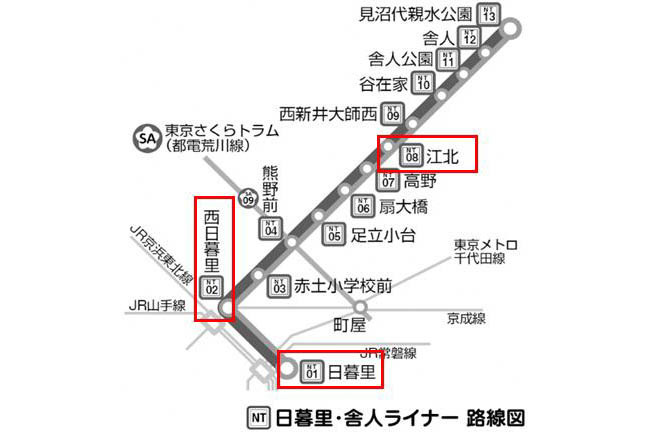Published: 2025-09-08 11:40
日暮里・舎人ライナー混雑緩和へ 江北~日暮里で貸切バス運行

東京都交通局と足立区は、日暮里・舎人ライナーの混雑緩和に向け、バスを活用した実証実験を12月下旬から2026年3月下旬まで実施する。江北駅前から乗車し、西日暮里駅前もしくは日暮里駅前で降車するバスを運行する方向で基本合意した。
平日7時から8時の間に江北駅前を出発するバスを1日3便、民間貸切バスを借上げて運行する。ダイヤは、江北駅前~西日暮里駅前~日暮里駅前が運行区間に含まれている都の路線バス(里48)を考慮して設定する。
対象利用者は、日暮里・舎人ライナーの見沼代親水公園駅~江北駅⇔西日暮里駅または日暮里駅の定期券所有者。
費用は都と区で半額ずつの負担を予定。開始時期は交通管理者等の関係者調整により前後する場合がある。
| # | 言葉 | 意味 |
|---|---|---|
| 3 | 江北駅 | こうほくえき (江北駅) : Kouhoku Station (station) |
| 3 | 日暮里駅 | にっぽりえき (日暮里駅) : Nippori Station (station) |
| 2 | 日暮里 | にっぽり (日暮里) : Nippori (place) |
| 2 | 舎人 | しゃじん (舎人) : 1. servant; valet; footman 2. someone who works in close quarters with the emperor or imperial family |
| 2 | 下旬 | げじゅん (下旬) : last third of a month; 21st to the last day of a month |
| 2 | 西日暮里駅 | にしにっぽりえき (西日暮里駅) : Nishinippori Station (station) |
| 2 | 運行 | うんこう (運行) : 1. service (bus, train); operation 2. motion; revolution; movement |
| 2 | 駅前 | えきまえ (駅前) : in front of a station |
| 1 | 東京都 | とうきょうと (東京都) : Tokyo Metropolis (prefecture); Tokyo metropolitan area |
| 1 | 交通局 | こうつうきょく (交通局) : traffic bureau; transportation bureau |
| 1 | 足立区 | あだちく (足立区) : Adachiku (place) |
| 1 | 混雑 | こんざつ (混雑) : 1. congestion; crush; crowding; jam 2. confusion; disorder |
| 1 | 緩和 | かんわ (緩和) : relief; mitigation; alleviation; relaxation (of restrictions, tensions, etc.); easing; softening |
| 1 | 向ける | むける (向ける) : to turn towards; to point |
| 1 | 活用 | かつよう (活用) : 1. practical use; application 2. conjugation; inflection |
| 1 | 実証実験 | じっしょうじっけん (実証実験) : proof-of-concept; demonstration experiment; verification test |
| 1 | 実施 | じっし (実施) : enforcement; implementation; putting into practice; carrying out; operation; working (e.g. working parameters); enactment |
| 1 | 乗車 | じょうしゃ (乗車) : boarding (a train, bus, etc.); getting into (e.g. a taxi) |
| 1 | もしくは | もしくは (若しくは) : or; otherwise |
| 1 | 降車 | こうしゃ (降車) : alighting (from a train, bus, etc.); getting off; getting out (of a car) |
| 1 | 方向 | ほうこう (方向) : 1. direction; orientation; bearing; way 2. course (e.g. of action) |
| 1 | 基本合意 | きほんごうい (基本合意) : basic agreement |
| 1 | 平日 | へいじつ (平日) : 1. weekday; ordinary days (i.e. non-holiday) 2. kanji radical 73 |
| 1 | 便 | びん (便) : 1. flight (e.g. airline flight); trip (e.g. train trip); service 2. mail; post; letter |
| 1 | 民間 | みんかん (民間) : 1. private; non-governmental; non-official; civilian; civil 2. folk; popular |
| 1 | 江北 | えきた (江北) : Ekita (place) |
| 1 | 西日暮里 | にしにっぽり (西日暮里) : Nishinippori (place) |
| 1 | 含む | ふくむ (含む) : 1. to contain; to comprise; to have; to hold; to include; to embrace 2. to hold in the mouth |
| 1 | 路線 | ろせん (路線) : 1. route (bus, train, air, etc.); line 2. line (taken by a group, organization, etc.); policy; course |
| 1 | 里 | さと (里) : 1. village; hamlet 2. countryside; country |
| 1 | 考慮 | こうりょ (考慮) : consideration; taking into account |
| 1 | 設定 | せってい (設定) : 1. establishment; creation; posing (a problem); setting (movie, novel, etc.); scene 2. options setting; preference settings; configuration; setup |
| 1 | 対象 | たいしょう (対象) : target; object (of worship, study, etc.); subject (of taxation, etc.) |
| 1 | 利用者 | りようしゃ (利用者) : user; end-user; consumer |
| 1 | 見沼代親水公園駅 | みぬまだいしんすいこうえんえき (見沼代親水公園駅) : Minumadaishinsui Park Station (station) |
| 1 | 定期券 | ていきけん (定期券) : commuter pass; season ticket |
| 1 | 所有者 | しょゆうしゃ (所有者) : owner |
| 1 | 費用 | ひよう (費用) : cost; expense |
| 1 | 区 | く (区) : 1. ward; borough; city (in Tokyo) 2. district (e.g. electoral); section; zone (e.g. postal) |
| 1 | 半額 | はんがく (半額) : half the amount (of money); half price; half fare |
| 1 | 負担 | ふたん (負担) : 1. burden; load; responsibility 2. bearing (a cost, responsibility, etc.); shouldering |
| 1 | 管理者 | かんりしゃ (管理者) : 1. manager; landlord; warden; superintendent; supervisor; custodian 2. root (user) |
| 1 | 等 | など (等) : 1. et cetera; etc.; and the like; and so forth 2. or something |
| 1 | 関係者 | かんけいしゃ (関係者) : person concerned; people involved (in an event); those concerned; staff |
| 1 | 調整 | ちょうせい (調整) : adjustment; regulation; coordination; reconciliation; tuning; fixing; tailoring |
| 1 | 前後 | ぜんご (前後) : 1. front and rear; front and back; before and behind; back and forth 2. before and after |